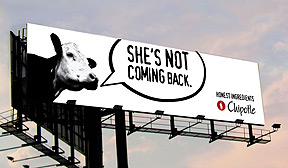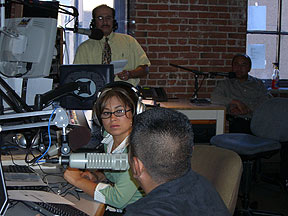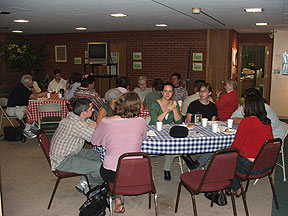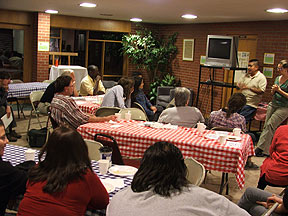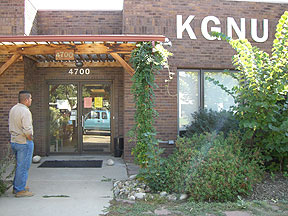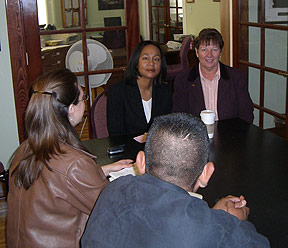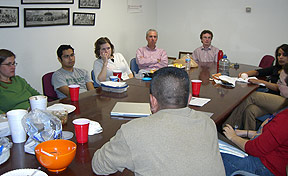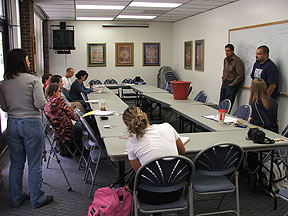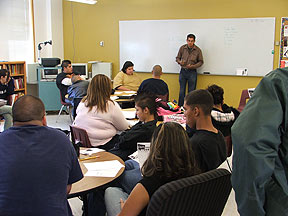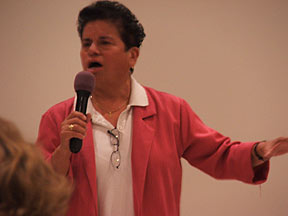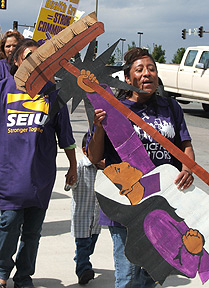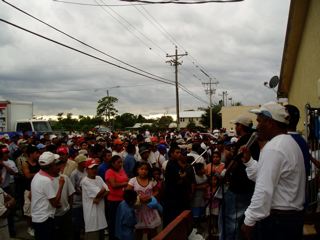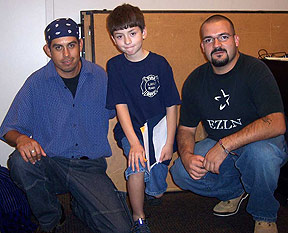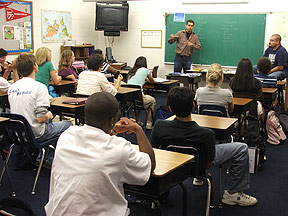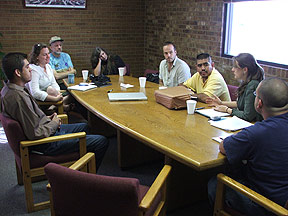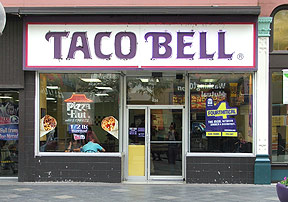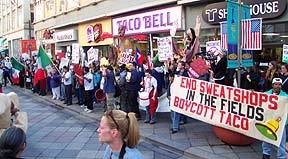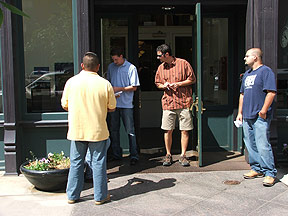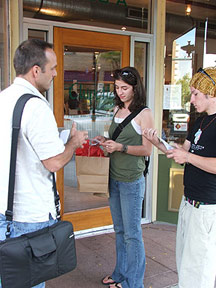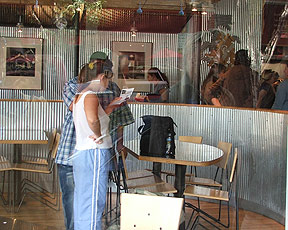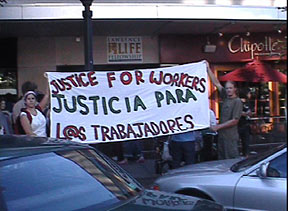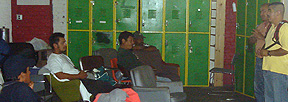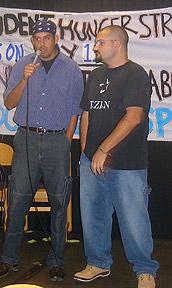DENVER 2006:
CIW TAKES CAMPAIGN FOR FAIR FOOD
TO CHIPOTLE’S HOME TOWN
|
DAY 8 – CIW TEAM WRAPS UP 2006 DENVER TRIP…
This simple but powerful notion of accountability — of finding within the country’s own declared ideals the means to denounce the nightmare of human rights abuse and racial discrimination that fell so horribly short of those ideals — was the central theme of what many call the greatest speech of the 20th Century. We have often found inspiration in the Civil Rights movement during the many years that we have been fighting for the fundamental human rights of farmworkers in Florida. And in that spirit, we borrowed from Dr. King to call on Chipotle to “live out the true meaning of its creed,” to make real the unfulfilled promise of its philosophy of “Food with Integrity,” a promise mocked by the contradiction between the labor exploitation in its tomato supply chain and its self-declared goal to “revolutionize the way America grows and gathers its food.” Chipotle has been called to account. What happens next will be a measure of Chipotle’s commitment to the inspiring words of its own guiding “vision.” |
If it were their philosophy, our first letter to Chipotle nearly nine months ago wouldn’t have gone unanswered. Indeed, if it were truly Chipotle’s philosophy, our first letter wouldn’t have been necessary at all. We first communicated with McDonald’s, Chipotle’s parent company at the time, nearly two years ago, and the Taco Bell boycott and modern-day slavery were making national headlines several years before that. Surely Chipotle has been aware of the conditions in Florida’s tomato fields for quite some time now. If it were their philosophy, Chipotle would have taken real measures to eliminate exploitation in its tomato supply chain long ago. But it hasn’t. Just as its customers would expect Chipotle to take immediate action if horrible animal abuses were revealed in its suppliers’ operations, we would expect the company to act, without hesitation, on human rights violations as well. But it hasn’t. All Chipotle has done is to stand behind the discredited, grower-controlled monitoring organization SAFE (click here for more on the origins and objectives of SAFE), satisfied that its growers are SAFE-certified. Here’s all you really need to know about SAFE: Even McDonald’s has taken the position that SAFE-certification is not enough to be a McDonald’s supplier… “Food with Integrity” is, however, a particularly effective marketing slogan. Thanks to clever billboards like the one pictured above, people all over Denver immediately recognize Chipotle and think of it as the “progressive” fast-food company. |
|
|
[Note to Chipotle’s Marketing Department: Here’s a suggestion for your next billboard — assuming you ultimately do work with the CIW to improve wages and working conditions in your supply chain — provided by a Denver Chipotle customer… Picture a billboard with a tomato picker in the left hand corner, his balloon reads: “When I pick tomatoes for Chipotle, I’m not treated like an animal”… Just thought we’d pass that on.] But instead, we get Chipotle complaining that they are being “unfairly targeted” because of their relationship with McDonald’s. As if “Food with Integrity” weren’t reason enough to hold the company to its own much-touted standards. In the end, you’ve got to make good on what you say you are, whether that’s a country that declares that “all men are created equal and endowed by their creator with certain inalienable rights,” or a company that sells “Food with Integrity.” And if you don’t live up to your own words, then it can hardly be considered “unfair” when you are called to account. |
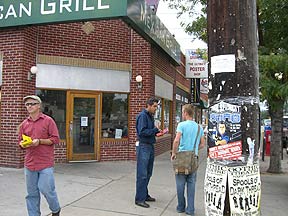 Now… on to the final update… Day 8 in Denver, the CIW team’s last full day in the Mile High City, provided one last opportunity to meet the people of Denver face-to-face and discuss the meaning of “integrity”. Here, one half of the CIW team distributes flyers outside of the “Alpha Chipotle” — the Chipotle restaurant that launched the 500-store chain, located just blocks from both the University of Denver and the Iliff School of Theology. |
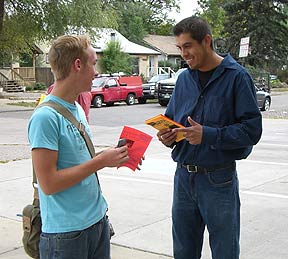 The flyering resulted in a number of great conversations — with customers and people from the restaurant alike — conversations that challenged people to question why a company with the unique character of Chipotle would buy its tomatoes just like any other corporation and react to this campaign just like any other corporation… |
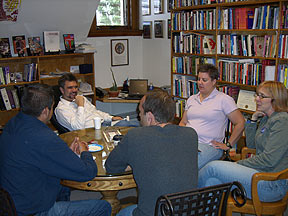 While in the area, Team One met with Dr. Miguel De La Torre (above, second from left), Director of the Justice & Peace Institute at Iliff. We were joined by two students from the Justice & Peace Institute for a discussion that began and ended with the commitment of the Institute to be an active participant in the efforts of the local Fair Food network formed at the Park Hill Congregational Church the night before (see the Day 7 Update below for more on the exciting new network that will carry the campaign forward in Denver in the months ahead). And in a particularly inspiring gesture, Dr. De La Torre also gave his individual endorsement to the national Alliance for Fair Food! |
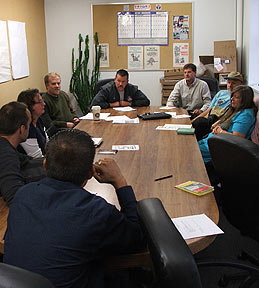 And speaking of endorsements… Team One wrapped up with a presentation at the Denver Jobs with Justice Steering Committee meeting, where the motion to join the Alliance for Fair Food was seconded and unanimously approved! |
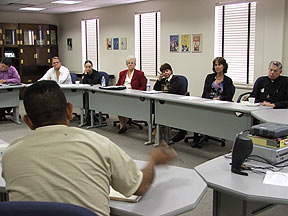 Meanwhile, Team Two was hard at work, meeting with the staff of Catholic Charities of Denver, members of the justice committees of local Denver area parishes, and the newly formed Migrants Coalition initiative of the Archdiocese of Denver… |
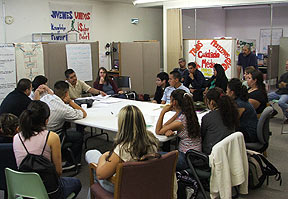 … and with our longtime friends at the offices of Jovenes Unidos and Padres Unidos, the exciting grassroots organizations that give the Latino community a voice that can’t be ignored in Denver… |
 … where Lucas Benitez of the CIW shared some popular education tools we use back home in Immokalee to lead a reflection on how fast-food companies contribute to farmworker poverty and how we as a community — workers and consumers together — can join forces to bring some of the wealth created by farmworkers back to the community where it belongs. |
Scroll down to read more from our week-long expedition to Denver – and stay tuned for all the developments to come from the Denver area network that will continue to press the cause of Fair Food in Chipotle’s backyard! |
|
DENVER DAY 7
|
 … then it was on to an interview with Denver’s Univision affiliate, together with Harold Lasso (center) of the Centro Humanitario, who received us on the first day of our Denver trip and remained a steadfast ally throughout the week. |
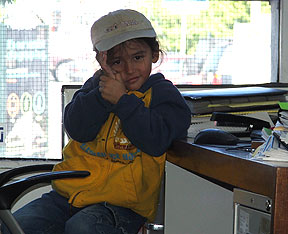 While at the Centro we had the distinct pleasure of meeting the future of the movement, Harold’s son Itza, who entertained himself throughout the interview at his dad’s desk (and distracted our photographer with his unbearable cuteness…). |
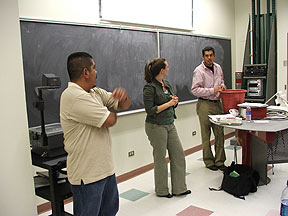 The CIW team headed back to school in the afternoon, this time speaking at a class on immigration history at the University of Colorado, Denver, Auroria campus… |
 … providing a different perspective — and, apparently, a bit of comic relief — to a topic that has grown tremendously divisive in Colorado, provoking students to think differently about issues of food production, consumption, and labor. |
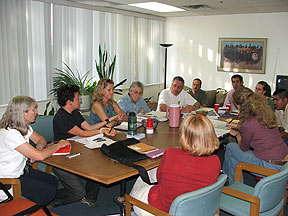 There was time for one more meeting before the day’s major event (the potluck gathering below), with a brief but warm exchange at the offices of the American Friends Service Committee (AFSC) during the regular meeting of Coloradans for Immigrant Rights. |
|
The evening began with an incredible home-cooked meal… |
This all-star lineup of labor, community, church, and youth organizations from Denver discussed ways to work together and with the CIW to press their neighbor, Chipotle, to live out the true meaning of its creed, “Food with Integrity.” Be sure to watch for news from this exciting new network in the weeks and months ahead! |
|
DENVER DAY 6
Here, Team One arrives at the studios of the extraordinary community radio station KGNU in Boulder, just north of Denver, for a live interview during KNGU’s morning news hour, one of two shows the CIW did on this busy day.
|
Our meeting with Reverend Felicia George (top, left) and Gwen Lipke of TIA-CO gave us hope that we would be able to work together as a force for good in the food industry, to bring long-overdue respect for human rights for the workers whose labor puts food on tables from Florida to Colorado. |
|
|
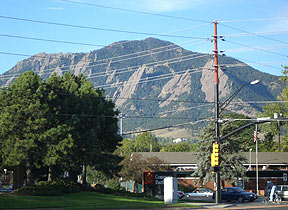 And, following lunch, it was back to Boulder, a beautiful little city nestled against the foothills of the Rocky Mountains (though the term “foothills” seems a little inadequate to us Floridians, truth be told)… |
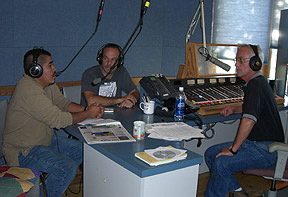 … for our afternoon interview with Dennis Creese, host of KGNU’s weekly program “Labor Exchange” and a third generation union member whose day job is as an organizer with the International Union of Painters and Allied Trades. Dennis’ show is, if not in fact unique, one of very, very few labor shows hosted by a labor organizer in the country today — which is quite a commentary on the media and labor… But Dennis does a great job, and people in the Denver area can catch the interview four weeks from now on KGNU. |
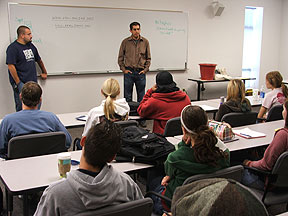 While Team One was meeting with religious leaders, lunching with labor groups, and hitting the media, Team Two spent the better part of the day talking with students, students and more students. |
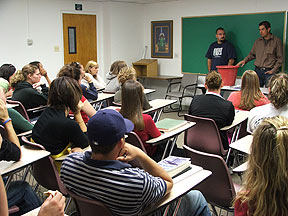 Regis University, which is fast earning the title “Fair Food University” for all the classroom presentations we have been invited to there, hosted three morning discussions and… |
|
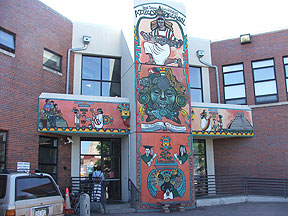 Team Two’s afternoon took them to a visit with our old friends at Escuela Tlatelolco, an alternative high school founded by Denver native, former farmworker, and leader of the Chicano movement, Rodolfo “Corky” Gonzales. Escuela Tlatelolco has a decades-long tradition of involvement in the fight for social justice and equality. Tlatelolco, sister city to the Aztec capital Tenochtitlán, was a center of education and fine arts for the Aztec Empire and later the site was used for Spanish education by the Spanish colonists. |
The teacher invited Team Two to discuss conditions in Florida’s fields and lead a reflection on what young people can do to demand the full respect of human rights in this country’s food industry. |
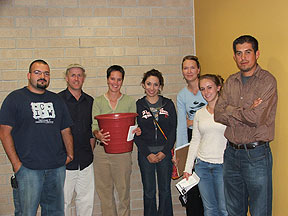 Then it was on to Denver University to visit with the Social Justice Community, a group committed to the study and practice of social justice and ethics. Their motto is, quite simply: “We will create a better world.” |
 Apparently a fundamental principle of that better world is “Integrity”… which should make for an interesting dynamic as the students at DU continue to study the contradictions between the sweatshop conditions in the fields where Chipotle’s tomatoes are picked and the restaurant chain’s mission of “Food with Integrity.” |
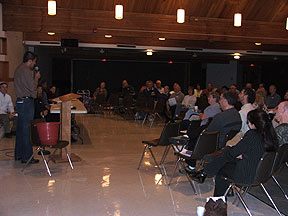 The terrifically productive day ended with a presentation at a well-attended “Immigration Panel” hosted by the Spirit of Christ Catholic Church … |
Coming soon: Day 7 and the future of the Campaign for Fair Food in Denver… |
|
DENVER DAY 4 & 5 |
 Like workers in Immokalee, these workers are organizing for simple dignity on their jobs — and for a brighter future for their children. |
 And children were front and center in this day’s protest, letting thousands of passersby know just who does the hard work every day to keep Denver beautiful. |
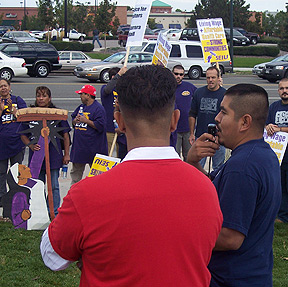 And it was in honor of that hard work that the CIW team joined in the picket — organized by the Service Employees International Union (SEIU) — and spoke in support of the workers’ call for a fair contract. Here Lucas Benitez (right) of the CIW addresses the picketers. |
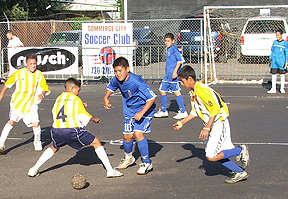 Then it was on to the Festival of Unity in Downtown Denver, where the kids got a street ball soccer match started… |
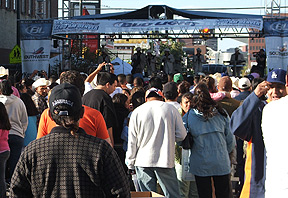 … and the adults partied to live music in a joint celebration of the independence of all Latin American countries. |
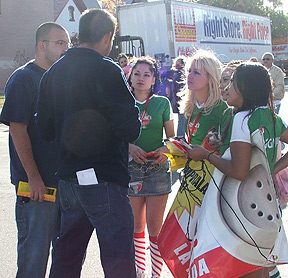 The CIW crew, of course, never stopped working, distributing flyers to the crowd of several thousand… |
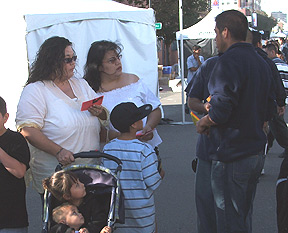 … and spreading the word of the Campaign for Fair Food, a campaign that caught the attention of people throughout the festival. |
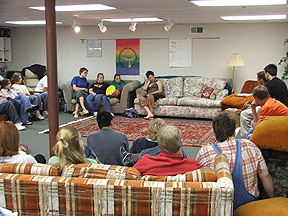 Sunday was an opportunity to attend services across Denver, as the CIW team split into three and visited with congregations from the Montview Boulevard Presbyterian Church, the First Unitarian Society, and Unitarian Youth from the First Universalist church, pictured here above. |
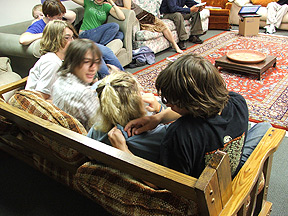 The young people of the Unitarian Youth club drew the connection between sweatshop conditions in the apparel industry overseas and the conditions found right here at home in Florida’s fields. Here, the kids read the labels off each other’s shirts to find where their clothes are manufactured. |
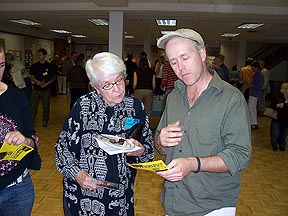 While here, Wisconsin organic farmer Mike Moon of Family Farm Defenders (a member of the Alliance for Fair Food) talks about the campaign and Chipotle’s role in farmworker exploitation with a member of the First Unitarian Church during one of two morning “coffee hours.” |
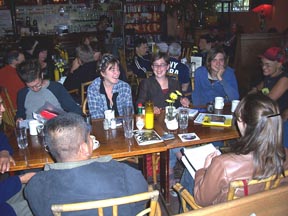 Sunday ended with the CIW team meeting at the Mercury Cafe, a popular gathering place, with a group of Denver youth organizing for economic and racial justice. Some of those present participated in the first local Chipotle action several weeks ago, flyering several restaurants and visiting corporate headquarters in July. |
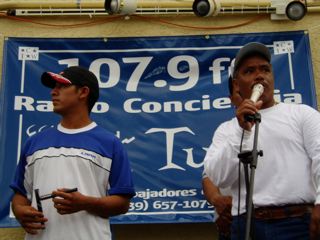 Meanwhile, news and photos arrived from back home in Immokalee, where the CIW’s radio station “Radio Conciencia” held a remote broadcast outside the CIW office… |
Stay tuned for more from Denver! |
|
DENVER DAY 3 Meet Tyger, the young man pictured here between Gerardo of the CIW (left) and Marc of the Student/Farmworker Alliance. Tyger is in the fourth grade here in Denver and met Gerardo and Marc when he and his mother attended a concert where the CIW was invited to speak about the exploitation of workers in Florida’s tomato fields. After learning about how his tomatoes are harvested on factory farms where workers pick under a hot sun up to 70 hours a week and never receive overtime pay, live in broken-down trailers with 10 or 12 other workers where they are charged sometimes as much as $1,800 a month for rent, lose their jobs if they get sick and can’t work, and get fired if they try to organize, Tyger decided he needed to help his friends learn about where their tomatoes come from, too. So on Friday, Tyger’s mom drove him to school early so that he could talk to the teacher who works as the sponsor of the Newspaper Club about writing an article for the school newspaper. Tyger will be sharing the story of Immokalee’s farmworkers with his fellow students in the next issue of his school paper. |
[And if you don’t believe farmworkers when they tell you that fast-food companies make farmworkers poor, then maybe you’ll believe a tomato industry insider… Click here to read an opinion piece, entitled “Big fast-food contracts breaking tomato repackers,” written for the nation’s leading produce industry journal, “The Packer,” by the owner of a tomato repacking company in Homestead, Florida. Here’s an excerpt: “Now, these growers are being forced to lower their prices for these specific tomatoes just so the repackers can break even. This eventually will work its way down to the tomato pickers, who may be forced to take a cut… Forcing down the cost of tomatoes, a minor component on the fast-food menu, does little to make the restaurant more profitable. It will go a long way toward harming a loyal group of suppliers and growers and their workers.” READ MORE] Here, above, Gerardo and Marc address students at Muellen High School in Denver. The CIW team has spoken in high schools and universities to hundreds of students since arriving in Denver on Wednesday. |
|
JwJ, like the Colorado Progressive Coalition, was a key ally in Denver during the Taco Bell boycott, generously lending their resources and their tremendous local credibility to our campaign. Their solidarity helped produce the largest protest of the early days of the Taco Bell boycott, bringing 500-600 people to an action outside a popular downtown Taco Bell restaurant. That protest went a long way to giving workers from Immokalee the faith that a national campaign to improve conditions in Florida’s fields was, in fact, possible. Our meeting today rekindled those bonds and helped establish new relationships that will surely make the Campaign for Fair Food even stronger as we work to extend the precedents for economic justice established in the Taco Bell boycott to the rest of the fast-food industry. |
It’s all so quiet now, since Taco Bell took a leadership role in the fast-food industry and entered into a partnership last year with the CIW to improve the wages and working conditions of the workers who pick their tomatoes…
Don’t miss this: For some of the sights and sounds of that exciting day, click here for a short video of the 2002 Denver Taco Bell protest! |
|
Yes, a spectre is haunting Chipotle… its shadow captured on film here at the entrance to Chipotle’s offices… in this case, a spectre armed with about 100 copies of the CIW’s letter to Chipotle CEO Steve Ells that the CIW team thought it would be helpful to share with the employees at Chipotle’s headquarters on this sunny afternoon. |
In fact, if anything, it seemed that most people simply hadn’t given much thought to the labor conditions in the fields where their company buys its tomatoes — which is precisely the problem for a company that gives so much thought to every other aspect of how their ingredients are grown and raised. Sincerity doesn’t seem to be Chipotle’s problem — but it will be soon, if, now that they have been made undeniably aware of the human exploitation in their supply chain, they fail to act. |
|
And young people also seem to get the idea that integrity is not a characteristic that you can turn on and off — it’s an all or nothing concept, black and white, 100% of the time or not at all. So, we spent much of the rest of Day Three talking to young people in Denver who like to eat at Chipotle. |
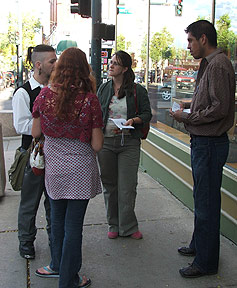 We spent several hours handing out flyers about the conditions in Florida’s fields outside a busy Chipotle restaurant in the Highlands district, where dozens of conversations like these popped up and people — many of whom were familiar with the Taco Bell boycott, being conscious consumers, and had read Chipotle’s response to the campaign in the Denver press coverage — were disappointed to hear that Chipotle wouldn’t jump at the opportunity to join Taco Bell in improving farmworker wages and working conditions. |
|
We explained that workers in Immokalee still held out hope that Chipotle would, after an initial defensive reaction, recognize the contradiction between the labor abuses in the Florida agricultural industry and Chipotle’s own commitment to “integrity” in its supply chain and work with the CIW to change those conditions, and so a boycott had not yet been called. Many people continued on their way to eat at Chipotle that night, but not without a new awareness of the harsh reality behind the food they ate there. Like the couple pictured above reading the flyer before ordering, dozens of customers learned some important new information about the food they eat. While they digest that new information, Chipotle can ponder its next move… |
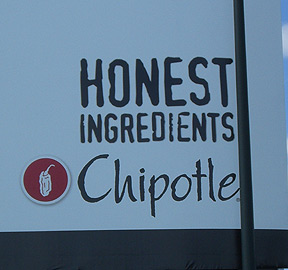 … Because, like it or not, the worst thing a company like Chipotle can do is make a promise it can’t keep. |
|
DENVER DAY 1 & 2 Now, as much as we might like, we can’t claim credit for the raucous action outside a Chipotle restaurant pictured here above, but we can take it as a powerful omen of good things to come from our Denver visit! The picture, and several others, came to us in our email on our first day here in Denver from an exciting group of allies in Lawrence, Kansas. They put together a truly impressive package of theater and action to commemorate the Taco Bell boycott victory and to launch the next phase of the Campaign for Fair Food in Lawrence. It’s great stuff, and you can see more pictures from there event by clicking here. In honor of their fine work, we saved the first picture of the Denver update for them… And one more thing before beginning the report from the first days in Denver… We thought it would be appropriate to share with you the letter that started it all, our February 9, 2006, letter to Chipotle’s CEO Steve Ells. Though we never received a response — any response — from Mr. Ells nor anyone else from Chipotle, we still think that the letter does a good job of conveying our hopes of starting a dialogue with Chipotle and the facts and feelings expressed in the letter remain true today. Click here to read the letter to CEO Steve Ells. |
Meanwhile, back in Denver… The press coverage of the CIW team’s arrival has been very strong, with articles on our visit in all the local papers, AP coverage carried across the country and overseas (the UK, France, the Netherlands, and Canada!…), and national coverage on the Spanish-language TV news giant Univision.
With these articles, the public debate over labor conditions in Chipotle’s tomato supply chain has officially begun, and Chipotle has come up with some pretty intriguing (for lack of a better word…) arguments in their initial defense. Stay tuned to the site for a closer look at Chipotle’s arguments, and the CIW’s response, in the days ahead. But for now, let’s just say this: If they continue to pursue their current approach to the campaign, Chipotle might just have to add an asterisk (*) to their marketing slogan “Food with Integrity” … |
|
The Centro Humanitario has been organizing for several years in Denver’s day laborer community, bringing about not just improved wages and working conditions but a sense of community in the otherwise harsh world of hard work and day-to-day survival faced by Denver’s day laborers. The Centro Humanitario is also part of the vibrant National Day Laborer Organizing Network (NDLON), fighting for protections at the national level for this particularly vulnerable sector of US labor. The CIW team and the workers gathered at the center found they had much in common. In fact, one worker at the Centro recalled picking tomatoes decades ago in Florida for nearly the same piece rate paid today. He pledged to join us whenever and wherever a protest might take place in Denver to help raise wages for tomato pickers.
|
(Note to Chipotle: These conditions are found wherever tomatoes are grown in Florida… ) |
|
With the democratization of communication technology and the rapidly growing market for fairly-produced consumer goods from fair-trade coffee to sweat-free clothing, one thing is increasingly clear: The companies that buy and sell the products of exploited labor — be it from overseas factories or fields right here at home — can no longer deny knowledge of the exploitation behind the products they sell. Chipotle is a company that has quite consciously positioned itself at the forefront of this emerging market of informed, activist consumers who view the food choices they make as opportunities to participate in making positive social change. And yet, when it comes to tomatoes, Chipotle has opted to buy its produce from growers who have fought positive social change — wage increases and improvements in working conditions — tooth and nail. This campaign is about building awareness, about communicating with Chipotle’s customers and informing them of the contradiction between Chipotle’s “Food with Integrity” and the sweatshop conditions faced by workers who pick Chipotle’s tomatoes. And awareness is a powerful thing. Perhaps one of the students at today’s USAS action said it best, when addressing both his university’s administration and the decision-makers at Chipotle: “Action without awareness is ignorance, but awareness without action is immoral.” |
The CPC is a long-time friend of the CIW and a key local ally from the early days of the Taco Bell boycott. They are a leader in the statewide movement to raise Colorado’s minimum wage, and fight for progressive change in the areas of racial justice, health care, and tax fairness. The CPC’s membership includes 40 civil rights, faith-based, labor, and community member organizations representing 250,000 Coloradans and 5,000 individual members. And the very best thing about the CPC… They are the newest member of the Alliance for Fair Food! The CPC has formally endorsed the AFF and will be joining the battle for Fair Food right here in Denver. We are eager to stand shoulder to shoulder, once again, with our friends at the CPC. Stay tuned for more updates from Denver in the days ahead! |



